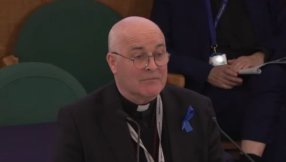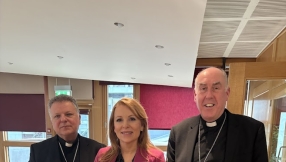Dr Michael Schluter on relational thinking and transforming society
CT: You said that when you started at Jubilee you had hoped to be part of a movement that would turn the UK back to Christ and that you felt that hadn't happened. Do you leave the position a bit disappointed?
MS: I came to realise that you will not turn Britain back to Christ by one or even a series of single issue campaigns.
We ran a successful campaign initially - Keep Sunday Special - but eventually the cultural tide of consumerism, individualism and consumer rights became so strong, like a tsunami, that we just got overwhelmed. We didn't lose Sunday completely but we lost it substantially.
We realised, therefore, that you will never win a single issue campaign - be it on abortion, betting, consumer credit and debt - when you are not tackling the underlying cultural tide. It became clear that we needed to address the underlying tide of consumerism and individualism, and that is a much, much bigger project.
I had become interested in relationships as the underlying and unifying principle of biblical law while working with the World Bank in Kenya in the 1970s (see Matt 22: 37-40, where 'love' is a description of relationship). The whole idea of what we call Relationism, or Relational Thinking for wider society, came out of a biblical reflection in which we looked at biblical laws talking about land, capital, the state, criminal justice, and what holds them together. Well, Jesus says it's all about love. When we asked what's love got to do with land tenure and the ban on interest and so on, the common theme of course is relationships.
It wasn't immediately obvious how you could base public policy on the theme of relationships but the more we did various projects the more we could see they were all really about relationships.
For example, Keep Sunday Special was about whether people should spend time at work or with their families at the weekend. Credit and Debt was about the impact of debt on family relationships and the relationship between the lender and the borrower. In South Africa we worked with the ANC in the apartheid era where the relationship was between black and white. Everywhere we looked it was about relationships, so I wrote The R Factor with David Lee in 1993, and the Jubilee Centre team established the Relationships Foundation as a separate charity.
My hope for the future now would be that God would bless the work of focusing on relationships both in the Jubilee Centre, as it tries to communicate this to the churches, and through the Relationships Foundation as we work with politicians and political parties, public services and the commercial world.
It sounds almost naïve to say it but perhaps over the next 10, 20, 30 years the whole culture of British society in the UK might shift from being based on individualism and materialism to being based on relationships. We are just starting to see some signs that that could conceivably happen. Firstly, Michael Gove gave a speech on August 4 on the politics of relationships, in which he talked about the need to see children, schools and society from a relationships point of view. Then Lindsay Tanner, the Minister of Finance in Australia, who is not a Christian, said he felt Relational Thinking has a key role to play in a post-capitalist political environment.
CT: How do you see Relational Thinking working within multi-cultural Britain? How do we project a biblical vision onto a society that is becoming increasingly pluralistic?
MS: I think that the most Christians can hope for is to have a cultural framework of thinking for their schools, hospitals, companies and prisons and so on, that comes out of biblical ideas, but which is inclusive.
We can't have something which is exclusively Christian because we are not a big enough proportion of the population. But if we could have something that grows out of Christian roots and ideas but which is able to accommodate people coming from many different positions, then that would take people towards the Gospel as opposed to away from the Gospel.
An emphasis on relationships, and defining what we mean by good relationships with an eye to Christian teaching, takes people away from materialism and individualism. Christianity is about a relationship between God and people. What Christianity is saying is that these relationships are the most important things in the world because God Himself is relational - Father, Son and Holy Spirit.
If you are thinking and talking relationships all day at work or at school and someone comes along with a relational message and says this is the key to the universe, it makes a lot of sense. But if you have been talking economics and money all day and then you come along and say that the key to the universe has nothing to do with money but it's about relationships, people say 'What?!'. It just has no connection.
CT: Jubilee Centre has engaged with many different social issues over the last 25 years, globalism, materialism, individualism, family, to name a few. But which of the many challenges do you think we have to tackle first?
MS: I think the main symptom of relational distress is the breakdown of marriage and what is happening both to children and older people. Malachi 4:6 - 7 comes to mind. I think there are six or seven major drivers behind the breakdown in marriage and the family and they include long and unsocial working hours, debt - because debt breaks up families like nothing else - the tax system, and corporate structures which mean that the people running companies have little connection with their employees. They therefore have little idea of what the daily life of their employees involves, and therefore what the effects are of their decisions on those employees. They just have to satisfy the needs of their shareholders.
Those factors are also breaking up communities.
What you end up with when you start looking at the world relationally is quite a broad theory of how society works, how it could be improved, what you could do about it, a broad public policy agenda. That's why we're interested in talking to all political parties about how public policy could be used to strengthen our Social (relational) capital, and how their existing policies are eroding social capital without them even realising that this is happening.
Therefore there is a need to have a triple bottom line approach to public policy, just as companies are meant to have. We should be evaluating everything the government does from an economic point of view, an environmental point of view and a relational point of view. At the moment we only look at the economic impact of policy, and sometimes the environmental impact, but we don't look at the relational impact of policy.
CT: Do you feel the political parties are listening?
MS: Increasingly, yes. It is still relatively early days but we are coming to a time when the political commentators are saying that there is a shift going on in the zeitgeist whereby in the past everything was evaluated in financial terms but now we are moving towards the behavioural sciences and saying that it's by these softer measures that we need to evaluate what's going on. And our relational message plays strongly into that environment; we are saying this doesn't need to be quite as soft and fluffy as it appears because you can assess relationship issues in a rigorous way.
CT: What do you feel most optimistic about in terms of Christianity's influence on society?
MS: I was brought up with an understanding of Christianity that was just about my personal relationship with Jesus (and it is about that), but God's concerns are so much greater than that. Seeing how the Bible addresses not just how I can deepen my relationship with God and other people, but also how the Lord wants us to order our public life - what God's purpose and pattern is for both national and international relations as well - it makes Christianity all encompassing as a religion. More all encompassing, in fact, than Islam.
At the moment the Muslims are saying we have a complete worldview and Christians are just concerned with an individual's relationship with God. That's not right. We are concerned with all parts of society in a more comprehensive way, a much less legalistic way, and a way that does not require us to force our views on other people. The Christian way of bringing change is through persuasion; Matthew 5:19 talks about those who teach and practise the law, not those who force the law on other people, as being great in the Kingdom. Christians have a profound message not just about what society should look like, but also how to get there.













